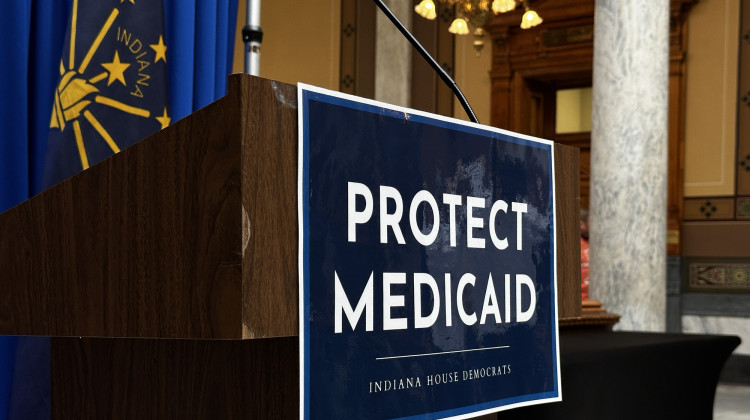
State spending on Indiana’s Medicaid program grew about 43 percent from the budget passed in 2021 to the one passed in 2023.
Abigail Ruhman / IPB NewsState spending on Indiana’s Medicaid program grew about 43 percent from the budget passed in 2021 to the one passed in 2023, prompting concern from some legislative leaders.
And then, the state announced a forecasting error that could add nearly $1 billion to the cost of the program in this budget cycle.
Reining in Medicaid spending is the task facing lawmakers and the next governor in 2025’s budget-writing session. But lowering those costs has real world consequences, sometimes for the most vulnerable people.
Here’s what the state’s six Republican gubernatorial candidates say about the issue:
U.S. Sen. Mike Braun (R-Ind.):
Braun likes talking about health care in the context of the business he ran for three decades. Predating the Affordable Care Act, Braun said he was able to reduce health care costs for his company by 50 percent and that his employees haven’t had a premium increase for 16 years.
Applying that to Medicaid spending, Braun said the way to bring down the cost is by shifting the program’s focus.
“Because we’ve got to change the paradigm from expensive remediation and treatment to emphasizing wellness and prevention, and educating all Hoosiers on Medicaid, Medicare or on the private pay side of how they become health care consumers and take better care of themselves,” Braun said.
Chambers’s entire campaign is centered on the idea that he’s a government outsider who wants to bring a business perspective to the governor’s office and run the state like a CEO.
And through that lens, Chambers said the first job is solving the “infrastructure issues” that led to the significant forecasting error.
“We need to run it like a business,” Chambers said. “And in a business, a $1 billion miss would be completely unacceptable and people would be fired and the deck would be vastly reshuffled because of it.”
Beyond that, Chambers said he would address Medicaid spending by going to what he believes is the heart of the issue: wage growth that isn’t strong enough.
“People are being left behind economically. And guess what happens with that? Government has to work harder,” Chambers said. “Medicaid roles expand when people aren't being lifted up through higher wages and earnings and opportunity, economic security.”
Chambers added that he grew up with a sister who was disabled and understands the “scary” challenges and concerns families are dealing with. He said any changes to the Medicaid program need to be handled with care, transparency and adequate time for transition.
As part of addressing the forecasting error, Crouch has called for an independent audit of the Family and Social Services Administration — which oversees Medicaid — and every state agency, in part as a bid to identify “cost savings and efficiencies” that she argues will help pay for her plan to eliminate Indiana’s individual income tax.
She said those potential savings can also be put to use in the Medicaid program itself.
“I believe when we go through that exercise with FSSA, we're going to find some cost savings that then can be directed towards these vulnerable populations and help us look at how we can serve them without exponentially growing that Medicaid cost,” Crouch said.
The lieutenant governor has been a leading voice in advocating for the families of medically complex children. And she said to address their concerns directly requires examining how the state provides services.
“Let's look at the training and the education that's required for the caregivers and for the health care workers that are serving these populations,” Crouch said.
Crouch said she also wants to explore new service models that could expedite training and licensing.
Join the conversation and sign up for the Indiana Two-Way. Text "Indiana" to 765-275-1120. Your comments and questions in response to our weekly text help us find the answers you need on statewide issues and the election, including our project Civically, Indiana.
Doden said the first task is more closely examining the forecasting error. He said it’s important to differentiate between just a projection of increased costs versus the actual need.
“So, that's one thing we're going to look and dig into those details,” Doden said.
Acknowledging the debate over care for medically complex children, Doden said any changes to Medicaid must be balanced between protecting the vulnerable and balancing Indiana’s budget.
Doden won’t say whether cuts to the program are inevitable.
“When you're running for office and you're all over the state of Indiana, meeting with people, it is hard to dig into the level of details that you have to dig in,” Doden said. “But what people know about my leadership style is, you know, there's a high level of accountability.”
Hill called it “perplexing” for the state to produce a $1 billion forecasting error and then “place it on the backs of the most vulnerable.”
“Indiana is supposed to have a multibillion dollar surplus,” Hill said. “So, it would seem that, instead of playing games with having X amount of surplus, we go back in, open it up, take that surplus and use it now to cover the error.”
Hill also acknowledged that addressing the increasing cost of the Medicaid program will likely require cuts.
“We want that impact to be a fair impact or an impact that's not directly crushing on the most vulnerable,” Hill said.
Hill said part of evaluating the Medicaid program will involve extending his proposal for all of state government, a “zero budget process.” He said that means agencies will have to start from zero when preparing their budget requests and justify every expense, rather than using the previous state budget funding figure as their starting point.
Reitenour said issues with the Medicaid program are indicative of what she calls a “crazy cycle” in which the government puts pressure on the middle class through taxes, which she said drives poverty, which then drives people to run to the government to pay for their needs.
Reitenour said her plan would be to empower “the church” and non-profit organizations.
“What I've done is build relationships with nonprofits, with pastors, letting them know, look, the Bible tells us to take care of the widows and the orphans,” Reitenour said. “We've got to get out. We've got to get into community. We've got to start offering programs that are going to help people.”
Reitenour added that the more people engage government, “the less we’re going to have our freedom.”
Brandon is our Statehouse bureau chief. Contact him at bsmith@ipbs.org or follow him on Twitter at @brandonjsmith5.
 DONATE
DONATE






 Support WFYI. We can't do it without you.
Support WFYI. We can't do it without you.